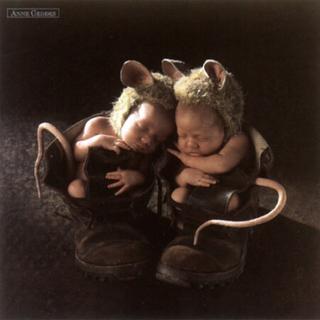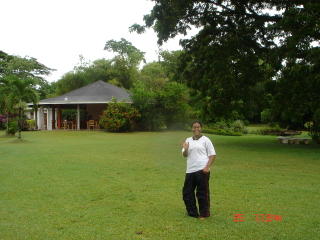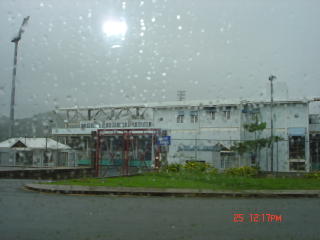aria's thoughts : emblazened sojournings
About Me

- Name: aria
- Location: Trinidad & Tobago
"The world is not what I think, but what I live through." ~ Maurice Merleau-Ponty
Monday, October 31, 2005
Saturday, October 29, 2005
** Capello: “An important but not crucial match" **

"We're going to play in an important stadium, against top level opponents, against whom we'll still be playing on equal terms. We have to face it with peace of mind and confidence in our means".
The memory of last year's challenge for the title is still alive and it's easy to draw a parallel but Fabio Capello says that the two matches cannot be compared: "This match is important but not crucial. If we were five matchdays from the end, it would be different, but at this point we have the whole season ahead. Anyway winning and stretching the lead over Milan up to eight points.. would not be bad".
The rossoneri have had a hard start of the season, while they're now marching at full pace: "I was surprised that they did not start well. This is a club of a great calibre, with top players and they couldn't but pull themselves together". One further threat for the Bianconeri defence may be Filippo Inzaghi's comeback: "Sure, Inzaghi is always a threat but all Milan players are: Gilardino, Kaka, Serginho, Seedorf, Pirlo... When you play against a team like this one you never know which side danger can come from. Anyway, we have nothing less than Milan".
If Milan have recovered Inzaghi, Juventus will have Patrick Vieira back at their disposal, as he's been called up for the match against the Rossoneri and Capello indicates him as the ace of this year's Juventus: "If we look at last year, it's his very goals that has given us something more. He's now back from the break, I don't know how much "power" he's got but I'm sure his versatility on the pitch will show. Besides Patrick, Ibrahimovic has recovered too, while Abbiati will surely miss the match as he had a fever until very few days ago".
~ Juve News

Wednesday, October 26, 2005
** Phrase Origins: "hoist by his own petard"

Meaning
Injured by the device that you intended to use to injure others.
Origin
A petard is or rather was, as they are long since fallen out of use, a small engine of war used to blow breaches in gates or walls. They were originally metallic and bell-shaped but later cubical wooden boxes. Whatever the shape the significant feature was that they were full of gunpowder - basically what we would now call a bomb.
The device was used by the military forces of all the major European fighting nations by the 16th century. In French and English - petar or petard, and in Spanish and Italian - petardo.
The dictionary maker John Florio defined them like this in 1598:
"Petardo - a squib or petard of gun powder vsed to burst vp gates or doores with."
The French have the word 'peter' - to fart, which it's hard to imagine is unrelated.
Petar was part of the everyday language around that time, as in this rather colourful line from Zackary Coke in his work Logick, 1654:
"The prayers of the Saints ascending with you, will Petarr your entrances through heavens Portcullis".
Once the word is known, 'hoist by your own petard' is easy to fathom. It's nice also to have a definitive source - no less than Shakespeare, who gives the line to Hamlet (1604):
"For tis the sport to have the enginer Hoist with his owne petar".

Tuesday, October 25, 2005
Monday, October 24, 2005
** Remaking of the world's worst flu"*
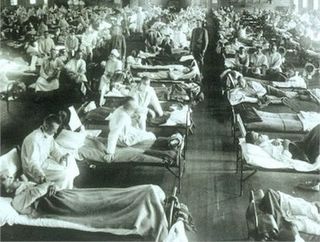
Just some of the 1918 flu victims.
Molecular pathologists gave the world some scary news on Wednesday. They said the strain of "bird flu" that has now killed more than 140 million birds in Asia is changing in ways that make it more like the "Spanish flu" that killed more than 20 million people in 1918 and 1919--in the deadliest pandemic since the Middle Ages' Black Death.
How do they know? Because of some even scarier research. Pathologists, led by Dr. Jeffery Taubenberger of the U.S. Armed Forces Institute of Pathology, actually reconstructed the virus that caused the Spanish flu. It took a decade, a high-security lab at the Centers for Disease Control and Prevention, and lung tissue from three of the Spanish flu's many victims, but they did it. If animal experiments are any indication, the reconstructed virus is as lethal as the original.
Study of the reconstructed virus suggests the Spanish flu was once a bird virus, too--one that mutated and jumped directly to human hosts. Researchers hope that studying the reconstructed virus will help them fight today's bird flu should it make the same jump. Here at KnowledgeNews, we're looking back to 1918, to see what experts fear most.
The Deadliest Flu Ever
In 1918 and 1919, nearly one-fifth of the world's population caught the flu. And not just any flu--the deadliest flu ever, one of the worst pandemics in human history.
Before it was over, 2 to 3 percent of those infected had died. That's at least 20 million people worldwide, more than twice the number killed in all of brutal World War I.
Swift and Fatal
Military bases served as incubators for the virus, in America and Europe especially. In fact, a huge number of casualties in World War I came from the flu, rather than from enemy fire. Within months, following troop movements and trade routes, the virus had traveled around the world.
The illness was so fast and so deadly that doctors couldn't even believe it was influenza. It wasn't like any flu they had seen before. A patient who started to feel under the weather on Monday was often dead by Wednesday. Many patients turned a blue-gray hue, as fluid built up in their lungs. "It is only a matter of a few hours then until death comes, and it is simply a struggle for air until they suffocate," reported a doctor at a military base near Boston. "It is horrible."
Even worse, this virus devastated people for whom flu is normally just an inconvenience. Healthy men and women in their twenties, thirties, and forties were dropping dead on the street on their way to work or the market. How could this be the flu? Some even speculated it was a plot by the Germans, or a side effect of the mustard gas used during World War I.
Dramatic Mutation
But it was the flu--a horrible new strain, but just the flu. Every few decades, the flu virus, which mutates at least a little bit every year, undergoes a dramatic change. This new virus is especially dangerous because no one has built up an immunity to it. The virus of 1918-19, from the time it likely got started in Asia, was this kind, different enough from previous strains that few people were immune.
Because flu spreads through the air, it was also frighteningly easy to get infected. All you had to do was breathe the air that a sick person had just coughed or sneezed into. The most dangerous place you could be was in a crowd.
Unfortunately, it was hard to avoid crowds in 1918. Hundreds of thousands of soldiers were being packed into barracks and onto troop ships. And huge military parades and war-bond rallies helped the virus make the leap from soldiers to the civilian population.
Flu Crosses the Nation
By autumn of 1918, life in big cities had become nightmarish. In one month--October 1918--nearly 200,000 Americans died from flu. Medical care was hard to come by, because so many doctors and nurses had been dispatched to Europe to care for the troops (and because many of those who stayed got sick, too). Churches, theaters, and taverns closed. In some cities, even funerals were limited to 15 minutes.
When one person in a family got sick, the flu usually spread to everyone else in the house. Volunteer nurses, arriving with broth and clean sheets, were seen as saviors by people too ill or too poor to get to a doctor. "In some cases," a New York City nurse wrote, "the nurses were even locked in the house by the patient's friends, or kidnapped on their rounds, so panic-stricken had people become."
The East Coast was ravaged in September 1918, and it took only a few weeks for the epidemic to spread to the West. In San Francisco and Seattle, wearing gauze masks was required by law. In Prescott, Arizona, the town council made it illegal to shake hands. Other towns quarantined themselves, forbidding trains from stopping, only to fall ill when they welcomed the postman. On the playground, children had a new jump-rope rhyme:
I had a little bird, and its name was Enza
I opened the window, and in-flew-Enza.
It's a Small World
By the time it had run its course, the 1918-19 flu had killed more than half a million Americans. Beyond the United States, the death toll was even more appalling. What Americans called the "Spanish flu" (incorrectly believing that was where it started) cropped up all over the world.
Germany, France, and the United Kingdom each lost at least 200,000 civilians between June 1918 and May 1919. More than a half a million Italians died. In poorer and more densely populated areas, the death toll was catastrophic. In parts of Mexico, more than 10 percent of the population perished. On South Pacific islands, more than 20 percent did. In India, at least 12 million people died from flu.
The death toll for the whole world is difficult to know, but the most conservative estimate is that 20 million people died. Many researchers double that number, and some go so far as to say that the death toll could have reached 50 million.
The 1918-19 pandemic was extreme, but not unprecedented. The World Health Organization has records showing that there have been 31 documented influenza pandemics since 1580, most recently in 1968-69. And medical experts say we're overdue for another devastating flu.
~ Colleen Kelly
October 6, 2005
Knowledge News

Saturday, October 22, 2005
** Juve News
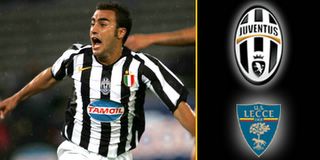
"The match against Bayern went wrong because we suffered the opponent without reacting and we lacked in aggression and grit that made the difference in the matches played so far". Fabio Cannavaro arrives at the press conference held at Sisport centre and wipes away any doubt about Tuesday's defeat being only a single episode and that it has to be canceled immediately: "You'll see a strongly determined team, we have to win at all costs as we want to keep the pace we've had so far. It won't be easy as they come from a positive result and the change of coach makes them want to do well".
The turnover involved nearly everyone, also in his role, like the cases of Thuram and Kovac, while Italy's captain has always been present: "Well, you see, Lilian is old - Cannavaro jokes - I think my turn will come sooner or later but I must say I'm always happy to play; on the other hand, it's just when you play all the time that when you finally stop you end up feeling the fatigue all at once. Changing partner in my role is not a problem for me: no doubt that I've been playing with Lilian for many years and we know each other well but I feel perfectly at ease with Robert too, he has always showed personality and self-confidence".
Juventus has a particularly tough week ahead: in fact, the matches against Lecce and Sampdoria will be the prelude to the challenge with Milan. The replay of last year's match this time won't be that decisive: "Meanwhile, we'll try to do well against Lecce and Sampdoria. It will be hard against the Blucerchiati as well, they have a very good coach who prepares the matches very well. They beat us last year and they have strengthened with Bonazzoli's arrival and they have one more important player they can lean on. Even if we won all these fixtures, the championship would still remain open: we had an eight-point advantage last year and we got caught up... We'd better avoid looking at the table or at the other clubs and go on our own way".
Fabio's last thought is dedicated to Ibrahimovic, who's becoming more and more the subject of journalists' questions: "Great forwards like him can only be contained. For us defenders, marking him is stimulating as he's strong physically and technically. When I find him in front of me during the training session it sometimes ends up that.. I hit him hard. He's young and he can still improve: us teammates use to tell him to be closer to the goal. He's capable of dribbling two, three opponents but he must try to be more ferocious when it comes to shooting at goal".

Friday, October 21, 2005
** Beethoven lives!

Beethoven Basics
Born in Bonn, Germany, in 1770, Ludwig van Beethoven became one of the greatest composers in the history of western music--despite being deaf for at least the last decade of his career.
Bonn Boy
Like most 18th-century composers, Beethoven was born into a musical family. When he was still little, his father tried to turn him into a popular child prodigy, as Mozart had been. Ludwig didn't exactly become a big child star, but by age 12 he had become a working musician.
By 1787, he had impressed the local socialites enough that they sent him to Vienna to study with Mozart. But that potentially momentous musical matriculation came to naught when Beethoven's mother died two months later. Beethoven returned home, took charge of the family (his father was an alcoholic), and became both a court musician and music tutor to the children of Bonn's social elite.
Then, in 1790, another famous composer--Joseph Haydn-- "rediscovered" Beethoven. In 1792, Beethoven left Bonn and went to study with Haydn in Vienna. Almost as soon as he arrived, Vienna was abuzz with rumors of the virtuoso from Bonn--a musician with the chops to rival even the recently deceased master Mozart.
Vienna Virtuoso
At the time, Viennese society was high on music, and Beethoven's performances became de rigueur. Aristocrats rushed to hear the impetuous pianist, who accrued enough fame and fortune to live as a freelance musician, beyond the system of aristocratic patronage his predecessors needed. But even as he reached new heights of popularity, Beethoven realized that he was going deaf.
Famed for his fiery demeanor, the composer complained in an 1802 letter to his brothers that those who thought him "malevolent, stubborn, or misanthropic" were mistaking a malady for misanthropy:
It was impossible for me to say to people, "Speak louder, shout, for I am deaf." Ah, how could I possibly admit an infirmity in the one sense which ought to be more perfect in me than others, a sense which I once possessed in the highest perfection, a perfection such as few in my profession enjoy or ever have enjoyed.--Oh I cannot do it.
Of course, he had already been composing for years by then. But as his hearing--and hence his performing career--deteriorated, Beethoven's compositions became increasingly important. They also became increasingly brilliant.
Masterpiece Maker
Around the time he first realized he was going deaf, Beethoven moved from what historians call his first or early period--during which his compositions were heavily indebted to Mozart and Haydn--to his second or "heroic" period. On the cusp of that transition came his famous Piano Sonata No. 14 in C Sharp Minor, later mercifully nicknamed the "Moonlight Sonata." (You're probably familiar with the first part, but have you heard the ferocious third movement?)
A few years later, Beethoven composed his Fifth Symphony, perhaps the world's most recognizable piece of music. (You're probably humming the first four notes to yourself already--three short Gs and a long E-flat.) Still, many would argue that Beethoven's most remarkable accomplishment was the Ninth Symphony, composed during his third and final period--and after he was completely deaf.
The Ninth Symphony incorporates parts of a poem--Friedrich Schiller's ode "To Joy"--sung by a chorus. No major composer had ever used a chorus in a symphony before, and the Ninth has since become known as the "choral" symphony. Tradition says Beethoven couldn't hear the audience applauding after its first performance--a musician on stage had to prompt him to turn around to see the cheering crowd. It was Beethoven's final symphony. He died in 1827, after a bout with pneumonia.
Steve Sampson
October 21, 2005
~Knowledge News Magazine.
Saturday, October 15, 2005
** Juventus News

Capello: "We must keep concentration high"
"We're favourite on paper but we have to be careful because Messina are in a good shape. It's true that they have conceded many goals, but they're playing well. In the other matches they conceded some "presents" , like clearances on the goal line or penalties not converted, but they're still a team to be cautious about."
Fabio Capello keeps pressure high before Saturday night early match; the match against Messina won't be easy as it occurs between the break for the World Cup qualifications and Tuesday's match against Bayern: "I'm working to keep the team concentrated as I do not want them to underestimate Saturday's match. The spirits are high and the International players are happy to have achieved their targets. Obviously, not all the players have trained with the group: those who have played two consecutive matches have trained separately, in any case I'm satisfied with their committment."
The Azzurri have returned Del Piero to Juventus in a dazzling shape; Italy's Captain played beside two other forwards, giving a remarkable performance. Is it a further solution for coach Capello too? "Del Piero played really well, like Mutu after all. Adrian has fully recovered. As much as Alex is concerned, he gives his best as second-string striker, especially when he starts from the left, like, in fact, he did with Italy. He can easily be dangerous from that position, both in scoring than in assisting the other teammates". Talking again about the International players, Capello wanted to dedicate a thought to Nedved too, who seems to be willing to accept the Czech Republic's call-up: "His International team has several important players unavailable for injury and I think it is fair for Pavel to accept the call-up and give his support."
~ Juve Magazine

** Nobel Medicine
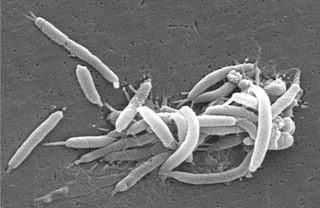
On Monday, two Australian doctors, Barry Marshall and J. Robin Warren, met at a pub in Perth to drink beer and wonder what it would be like to win the Nobel Prize for medicine. While at the pub, they won that prize, along with $1.3 million, a gold medal, and handshakes from the king of Sweden.
Marshall and Warren are the dauntless doctors who discovered that bacteria--and not stress or diet--generally cause stomach ulcers. At first, traditional medicine laughed at the notion. Dr. Marshall actually had to infect himself to prove it was true.
Early scorn aside, the discovery changed stomach ulcer treatment, and it may change medicine itself, as part of "Germ Theory, Part II." But hold on there, Nobel doctors. What's "Germ Theory, Part I"?
Today's Knowledge
Germ Theory, Parts I and II
The idea that disease is caused by invading microbes is really rather new. It wasn't until the mid-19th century that scientists learned that "germs" could multiply inside your body and make trouble. And it wasn't until far more recently that they discovered just how various that trouble can be.
Germ Theory, Part I
In 1864, the French scientist Louis Pasteur (who succeeded in developing vaccines for anthrax and rabies) concluded that some really bad microbugs can live in the air. By 1876, Robert Koch, a German, had extended Pasteur's observation into a discovery of huge medical significance. Koch proved that tuberculosis, a scourge of the 19th century, was transmitted through a specific type of airborne particle.
Koch's discovery--that specific diseases are caused by specific pathogens--revolutionized medicine. He famously outlined four postulates for linking microbes to diseases:
1. A specific microorganism is always associated with a given disease.
2. The microorganism can be isolated from the diseased animal and grown in the lab.
3. The cultured microbe will cause disease when transferred to a healthy animal.
4. The same type of microorganism can be isolated from the newly infected animal.
For the first time, doctors had a "Germ Theory" they could use to investigate disease in the lab and diagnose people in the world. Koch's postulates still stand as a way to determine whether a specific microorganism causes a disease.
And Now, Part II
But doctors aren't resting on their laurels. Today, some scientists believe that many diseases we now attribute to myriad causes--such as cancer and heart disease--may actually be caused by pathogens. It's "Germ Theory, Part II," and research on stomach ulcers has paved the way for its broader acceptance.
For years, doctors blamed stomach ulcers on spicy diet, aspirin irritation, or stress. But in 1982, Australian doctors Barry Marshall and J. Robin Warren discovered that when ulcer patients with stomachs full of spiral bacteria (Helicobacter pylori) were given antibiotics, their stomach pains and ulcers disappeared.
At first, the clinical community ignored their research. So Marshall took extreme measures. In 1985, he swallowed a cocktail of spiral bacteria and proved that the bacteria do cause stomach ulcers. With antibiotics, up to 90 percent of stomach ulcers can be tamed. Even better, a simple breath test can detect the pathogen.
This kind of evidence has some doctors believing that diseases we attribute to genes or the environment are really caused by germs. For example, patients with coronary heart disease tend to have a lot of antibodies to the virus Chlamydia pneumoniae. Does that suggest heart patients may be battling an infection that triggered inflammation, plaque, and ultimately arterial blockage? Some doctors think so--and say that, one day, we'll pin heart attacks on a germ.
Michael Himick and Christina Catron
October 4, 2005
~ Knowledge News Magazine

Friday, October 14, 2005
** Phrase origins : "Beat a hasty retreat"
Meaning:
Withdraw rapidly.
Origin:
This is a relatively recent phrase and is a commonly used cliche variant of "beat a retreat". The earliest printed citation is known from 1883:
S.C.Hall, Retrospect - "An unpopular candidate had frequently to beat a hasty retreat from the hustings."
Many people would now say "beat a retreat" but originally it was "beat the retreat." A retreat wasn't just a generalised withdrawal but a specific military procedure established by the British Army. Back in the 16th Century, war may have been a brutal hand-to-hand affair, but it was conducted under rules of engagement that now seem somewhat quaint. These were laid out in some detail by the British Army's "Rules and Ordynaunces for the Warre" , dated 1554, and also by Robert Barrett in his "Theorike and Practice of Moderne Warres", dated 1598.
One of the niceties that modern-day combatants don't enjoy is the custom that, at sunset, all hostilities ceased and the soldiery went back to their camps to bed. The signal for this was a pattern of drum beats known as "The Retreat". So, a retreat wasn't a signal to fall back and give up occupied land as it is now, but a signal to retire to bed. The earliest reference to the retreat came from the mid-17th century, as in this command from 1690, from an officer in the Army of James II :
"The generalle [the signal to get up and start fighting again] to be beate att 3 o'clock in ye morning. Ye retreate to beate att 9 att night...".

Withdraw rapidly.
Origin:
This is a relatively recent phrase and is a commonly used cliche variant of "beat a retreat". The earliest printed citation is known from 1883:
S.C.Hall, Retrospect - "An unpopular candidate had frequently to beat a hasty retreat from the hustings."
Many people would now say "beat a retreat" but originally it was "beat the retreat." A retreat wasn't just a generalised withdrawal but a specific military procedure established by the British Army. Back in the 16th Century, war may have been a brutal hand-to-hand affair, but it was conducted under rules of engagement that now seem somewhat quaint. These were laid out in some detail by the British Army's "Rules and Ordynaunces for the Warre" , dated 1554, and also by Robert Barrett in his "Theorike and Practice of Moderne Warres", dated 1598.
One of the niceties that modern-day combatants don't enjoy is the custom that, at sunset, all hostilities ceased and the soldiery went back to their camps to bed. The signal for this was a pattern of drum beats known as "The Retreat". So, a retreat wasn't a signal to fall back and give up occupied land as it is now, but a signal to retire to bed. The earliest reference to the retreat came from the mid-17th century, as in this command from 1690, from an officer in the Army of James II :
"The generalle [the signal to get up and start fighting again] to be beate att 3 o'clock in ye morning. Ye retreate to beate att 9 att night...".

Tuesday, October 11, 2005
COFFEE BEANS

There is a man's face amongst the coffee beans. See how long it takes for you to spot him.
If you find the man in 3 seconds, the right half of your brain is more developed than most people.
If you find him between 3 seconds and a minute, then the right half of your brain is developed normally.
If you find the man between 1 minute and 3 minutes, the right half of your brain is a mess and the only advice is to look more for these types of exercises to make that part of your brain stronger.






